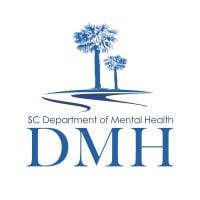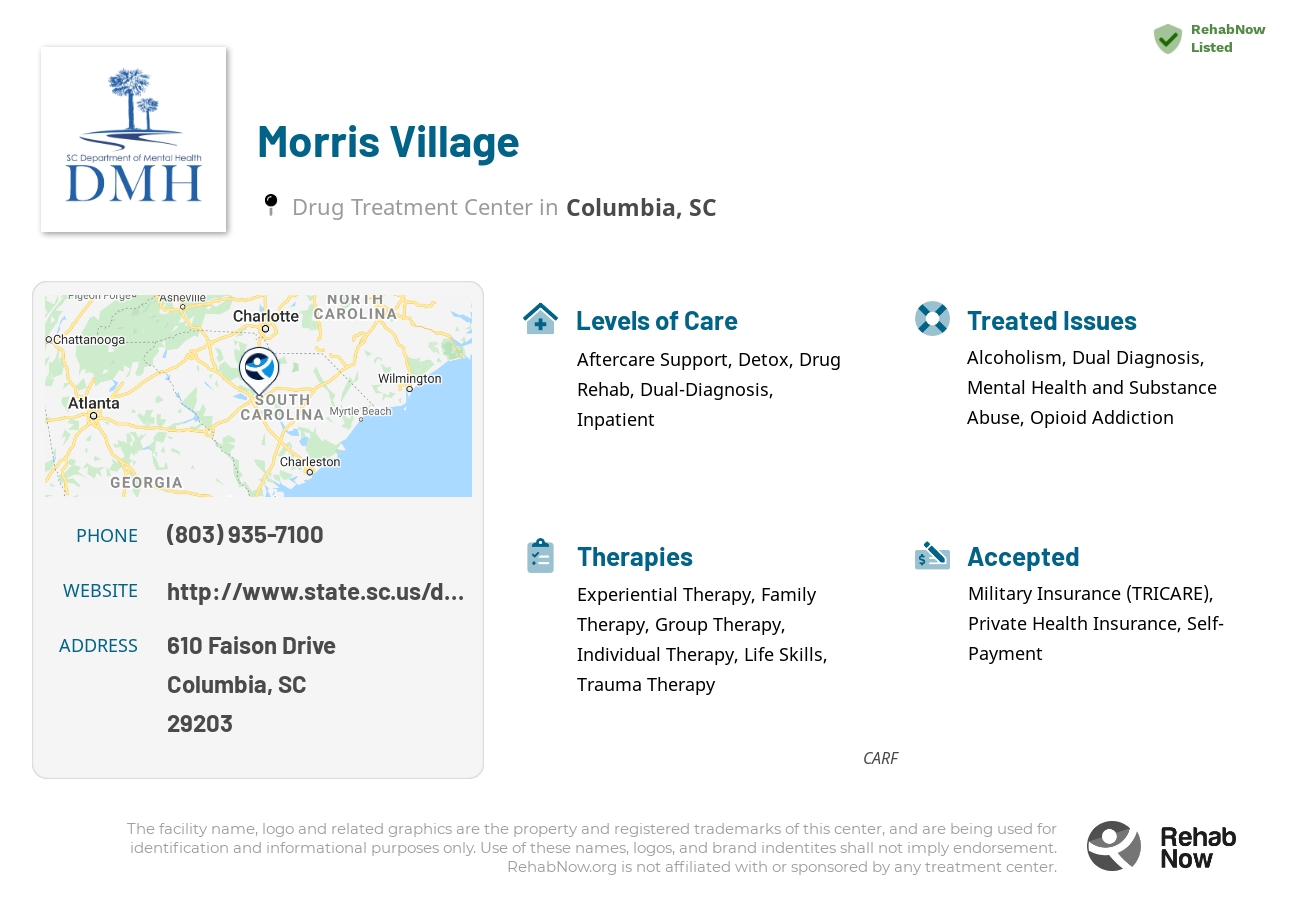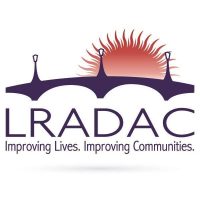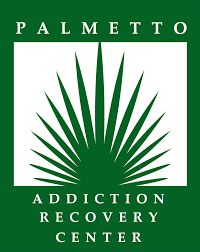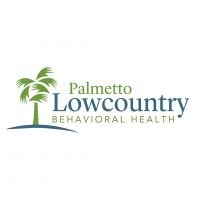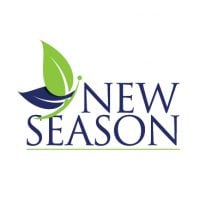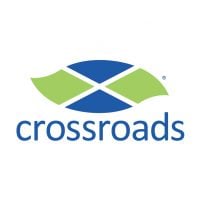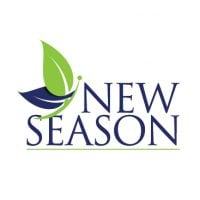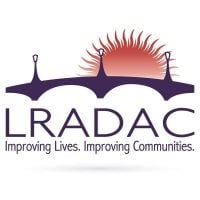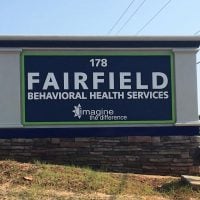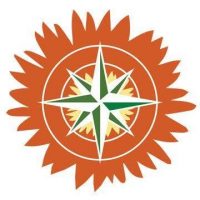Morris Village
Drug Rehab Center in Columbia, South Carolina
Morris Village is a drug and alcohol rehabilitation center in Columbia, SC that offers comprehensive and compassionate care for addiction, alcohol abuse and dual diagnoses through a range of services including detox, inpatient treatment, therapy, and aftercare support with a holistic approach.
About Morris Village in South Carolina
Morris Village is a renowned and respected drug and alcohol rehabilitation center based in Columbia, SC. The clinic specializes in providing comprehensive and compassionate care for those suffering from addiction, alcohol abuse and dual diagnoses (co-existing disorders). The clinic's skilled and knowledgeable staff offer a range of services including detox, drug rehab, inpatient treatment, aftercare support, group therapy, individual therapy, experiential therapy and family therapy to ensure that each person's needs are met. Morris Village is accredited by CARF and accepts private health insurance. They are also affiliated with Columbia Area Mental Health Center, so all of their clients have access to their full range of services and resources.
At Morris Village, a holistic approach is used to ensure that individuals get the best possible care for their addiction or dual diagnosis. The staff have expertise in treating all types of addictions, such as alcohol abuse, opioid addiction and drug addiction. They use a variety of methods and treatments to ensure that individuals are able to make positive and lasting changes in their lives. This includes experiential therapy, trauma therapy, life skills and more. The clinic understands the importance of providing a supportive and nurturing environment to help individuals on their recovery journey and provide aftercare support to help them maintain their sobriety in the long-term.
Genders
Ages
Modality
Additional
Accreditations

CARF
The Commission on Accreditation of Rehabilitation Facilities (CARF) is a non-profit organization that specifically accredits rehab organizations. Founded in 1966, CARF's, mission is to help service providers like rehab facilities maintain high standards of care.
Conditions and Issues Treated
Opioid addiction has become a significant health problem in the United States. When a person’s life becomes unmanageable because of an opioid addiction, treatment can help them get sober. Treatment includes medical care and counseling.
“With so many people struggling with opioid addiction, we need more care and attention for those who want to quit. Opioid addicts often take opioids when they experience a painful injury – that’s how the cycle starts! When someone begins taking their medication differently than prescribed or takes an excessive amount of drugs, it means they’re hooked on drugs and in danger of overdosing.
The most successful way to beat this is through detoxing from these types treatments at Morris Village in . Most facilities start by using medical support during the process while providing counseling services; rehabilitation comes later on after treatment has been completed successfully.
A “dual diagnosis” is when the individual has two medical issues at the same time. The top co-occurring mental disorders with addiction are depression, anxiety, ADHD, bi-polar disorder. Addiction is also considered a mental illness that is not a choice but rather a medical condition. Addiction can be caused by any number of underlying issues.
Dual diagnosis is provided by Morris Village to treat addictive tendencies as well as any untreated mental illnesses. This ensures successful long term health and recovery for patients after treatment has been completed.
Dual diagnosis is provided by Morris Village to treat addictive tendencies as well as any untreated mental illnesses for people in South Carolina. This ensures successful long term health and recovery for patients after treatment has been completed.Levels of Care Offered
This center offers a variety of custom treatment tailored to individual recovery. Currently available are Aftercare Support, Detox, Drug Rehab, Dual-Diagnosis, Inpatient, with additional therapies available as listed below.
The first level of recovery is detox. It involves giving a person the opportunity to get the toxins out of their body safely. The individual receiving treatment at Morris Village typically will get ill during detox, and they will often start using again to get rid of unpleasant emotions and complicated physical responses. It is why having a South Carolina medical professional present is so critical. A medical professional can make sure that patients do not start using again during detox and stay physically healthy during the process. They will also have treatment on a mental level to relieve their symptoms and guide them through the process.
Going to an inpatient rehab facility means living there while all aspects of addiction or co-occurring disorder get addressed. The treatment involves medical supervision, therapy, and future planning.
This type of rehabilitation provides a drug-free environment for people who struggle with chronic/long-term addiction without having access to drugs outside the center (or their own home). It takes away any distractions because they live there 24 hours per day. If someone is trying to break out old habits, which could lead them back into substance abuse, things like jobs or school can be put on hold until after they complete their stay to focus solely on recovery.
Without aftercare support, addicts can easily relapse back into addiction. It is crucial to integrate the addict back into society. Aftercare support should take place after outpatient treatment has ended.
There are a few different types of aftercare support that patients can seek after completing an inpatient treatment program:
- 12 Step Self-help groups (AA, NA)
- Therapeutic communities,
- Long-term, structured sober living arrangements
- Halfway houses (residential treatment centers)
Many different support groups exist for addicts to seek help after treatment. Some are more effective than others, depending on the person’s addiction, background, and other factors.
Therapies & Programs
Individual therapy is a form of counseling where you meet with a trained professional one-on-one. Meeting with a therapist in this setting allows for a personal and trusting relationship to be built. This allows the patient to open up about sensitive or private issues they may not feel comfortable discussing in a group. Individual therapy helps identify the root causes of your addiction, which can help prevent relapse.
Family therapy is often done alongside drug treatment to help addicts stay sober. The goal of family therapy for drug addiction is to create an environment where communication can happen without judgment, hostility, or blame. The therapist will sit with the family so they can learn how to communicate differently and provide new tools for dealing with emotions so that people don’t want to drink or do drugs. It’s important for families to focus on relapse prevention plans during treatment so that if the addict feels like they want to use again, they’ll know what steps they need to take together to prevent it from happening again in the future.
Group therapy sessions are another common addiction recovery service. These group sessions typically involve six to 12 addicts who meet regularly with a trained professional for support and guidance.
During these sessions, the group shares their experiences with one another and provides feedback that can help each member avoid relapse or overcome specific obstacles they are facing in their recovery process. With this type of support and guidance, addicts can feel like they are part of a community that understands their struggles and will help them get through the hard times.
Many people struggling with drug addiction have experienced some form of trauma in their lives. It is crucial that these individuals seek out professional help; otherwise, their drug abuse and addiction will likely continue.
Therapists and counselors at drug treatment centers employ several treatment programs to help people struggling with drug addiction, including trauma therapy. Trauma therapy helps people dealing with addiction by allowing them to confront the traumas of their past and move past them.
It is important to note that trauma therapy should not be confused with PTSD (post-traumatic stress disorder). Rather, it is used to treat the effects of trauma, which are often at the root of addiction.
It’s not as simple as quitting drinking or using drugs and expecting the hard part to be over. Many addicts in recovery have discovered that they need to improve skills such as time management, organization, communication, socialization, and self-esteem. Learning certain life skills can help those who are struggling with addiction.
Patient Experience
Experiential Therapy at Morris Village
Drug addiction causes the formation of abnormal connections between neurons in the brain to form due to repeated exposure to drugs. These connections are responsible for addictive behaviors to drugs. Experiential therapy is done with patients individually and is different from traditional talk therapy. This therapy can help people revisit past traumas, heal, and move on in life in a more authentic way.
Experiential therapy uses activities to recreate experiences that may have caused trauma or negative emotions. These activities include role-playing, arts and crafts, animal care, music, or rock climbing. The individual will gradually experience calmness and love and change their perception positively through this therapy. Other than drug addiction, experiential therapy can be helpful for behavioral or eating disorders.
Payment Options Accepted
For specific insurance or payment methods please contact us.
Is your insurance accepted?
Ask an expert, call (888) 674-0062
Columbia Area Mental Health Center Associated Centers
Discover treatment facilities under the same provider.
- Columbia Area Mental Health Center - Adolescent in Columbia, SC
- Columbia Area Mental Health Center - Adult in Columbia, SC
- Columbia Area Mental Health Center - Mental Health Court in Columbia, SC
- Bamberg County Clinic in Denmark, SC
- Columbia Area Mental Health Center - Columbia in Columbia, SC
Learn More About Columbia Area Mental Health Center Centers
Additional Details
Specifics, location, and helpful extra information.
Columbia, South Carolina 29203 Phone Number(803) 935-7100 Meta DetailsUpdated November 25, 2023
Staff Verified
Morris Village Patient Reviews
There are no reviews yet. Be the first one to write one.
Columbia, South Carolina Addiction Information
More than 610,000 of South Carolina residents, or a staggering 11.9% of the state population, uses illicit drugs and another 230,000 residents abuse alcohol every year. A majority of the illegal drugs used and abused are opioids. Marijuana use and underage drinking occur amongst the young residents of this state–though at a lower rate compared to the national average.
In Columbia, South Carolina, drug addiction is a major issue. An estimated 9.4 percent of people in Columbia abuse drugs. Additionally, Columbia has a higher rate of overdose deaths than the national average. The most commonly abused drugs are cocaine, methamphetamine, heroin, and prescription opioids. There are a variety of drug rehab centers in Columbia, South Carolina. The most common types of treatment are inpatient and outpatient.
Treatment in Nearby Cities
- Knoxville, SC (81.6 mi.)
- Greenville, SC (96.3 mi.)
- Camden, SC (24.3 mi.)
- Belton, SC (91.4 mi.)
- Orangeburg, SC (41.7 mi.)
Centers near Morris Village
The facility name, logo and brand are the property and registered trademarks of Morris Village, and are being used for identification and informational purposes only. Use of these names, logos and brands shall not imply endorsement. RehabNow.org is not affiliated with or sponsored by Morris Village.
